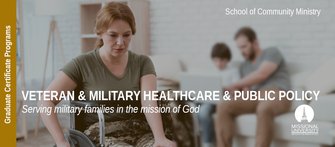
This 18-credit Graduate Certificate in Veteran & Military Healthcare & Public Policy provides knowledge and skills that can be immediately applied by community ministry leaders, chaplains, pastors, mental health practitioners, maternal & newborn health practitioners, geriatric care practitioners, rehabilitation care practitioners, oral care practitioners, public health practitioners, community health educators, human services professionals, social workers, and others who work with veteran and military families. This credential empowers you to serve your community, broaden your skillset, and enhance your resume. Taught by Christian experts in medical theology, military medical chaplaincy, and healthcare chaplaincy, the program equips students to demonstrate the love and compassion of God by advocating for first-class military healthcare systems; caring for the health of veteran & military families; understanding ways spirituality shapes one's perspective of health, disease and medicine; and sharing the good news of redemption, restoration, and renewal in situations of health trauma.
According to the International Institute for Strategic Studies in their 2019 report, more than 14.5 million people serve in the militaries of the top 30 countries with the largest military forces - of that about 1.3 million are active duty in the US military. With over 18 million veterans, the United States has about 20 million veterans and active military - and their families - to serve. Due to the circumstances that active and veteran military have experienced, whether deployed or not, their healthcare needs may include injury, post-traumatic stress disorder (PTSD), suicide prevention, depression, rehabilitation, chronic conditions, end-of-life care, and other physical and psychological needs. Through the Graduate Certificate in Veteran & Military Healthcare & Public Policy, you gain an understanding of not only the veterans and active military dealing with physical and psychological issues of war and military service, but also how to best help these patients and families navigate the systems available to them while innovating to assist them more efficiently in the future.